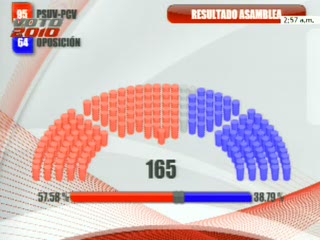Venezuela: Socialists win the election, but you wouldn’t know it from our media
Posted by Jack in Uncategorized, tags: elections, venezuela
President Chavez casting his vote
Sunday saw a key test of the strength of the Bolivarian revolution in Venezuela, with elections to the National Assembly.
The opposition to the revolution, which is composed of the middle and bosses classes who are angry about losing their monopoly over Venezuela’s wealth and political power, and who are funded by US imperialism, had a big push for the elections. For the first time since President Chavez was elected in 1998, they seemed to have got their act together a bit. For years, they have been bitterly squabbling amongst themselves, as they tried to come to terms with the fact that the poor majority of Venezuelans had no interest in their right wing politics any more. In the last Assembly elections in 2005, they knew they didn’t have a chance in hell of getting anywhere, and so pretended there was a chance of fraud and refused to participate.
As a result, for the last five years the National Assembly has been almost entirely dominated by supporters of the revolution. Having over two thirds of the parliament allowed the United Socialist Party of Venezuela (PSUV) and their allies to pass laws quickly, appoint officials to national positions, and generally not really have to care what the US puppets in the opposition thought.
But this time around, knowing that international observers and anyone with any common sense knows that Venezuela is ultra-democratic, and allegations of vote rigging would just look stupid, they got together to finally put together a united slate for the elections, the Democratic Unity Roundtable or MUD.
Given that last time they didn’t stand at all, winning anything would have been an advance for them. Internationally the media built up MUD, claiming they were set to win big. But realistically, everyone knew the revolution still has the support of the majority. The big question was, would PSUV be able to win a two thirds majority (110 seats)?
In the end the tally left the socialists just short of what they needed to retain a ’supermajority.’ But they still have an overwhelming majority of the seats, with PSUV having won 95 seats so far (three have still to declare), giving it 58% of the seats. MUD won 62 seats, or 39%, while the Fatherland For All party (which is pro-revolution but not part of PSUV) won 2. Under Venezuela’s revolutionary constitution 3 seats are reserved for representatives of indigenous peoples, and those that took them are part of neither side.

The make up of the newly elected assembly
This means that the government will still be able to pass normal laws and are still in control of the assembly, but it leaves more scope for the opposition to slow things down, force the government to negotiate with them, and generally make a nuisance of themselves. Laws that relate to issues in the revolutionary constitution have to be passed by two thirds majority, so that will now be more difficult. And the assembly also appoints positions such as the Supreme Court and the Electoral Council, which the opposition will now have some say in.
Socialists in Venezuela were still celebrating the victory, even if it wasn’t as strong as they would have liked. As President Chavez put it himself on Twitter: “The election was a solid victory, sufficient to continue deepening democratic and Bolivarian socialism. We must continue strengthening the revolution!”
He added at a press conference: “Nothing extraordinary happened. Something extraordinary would have been if we won 130 deputies, extraordinary would have been if we lost the majority.”
When you compare the support the government to other countries, especially the US or UK, it enjoys an unbelievably high level of popularity, considering how long they have been in power, and how difficult the economic circumstances are. Nevertheless, the election didn’t give the socialists as good as a result as they have often enjoyed in other electoral tests. There’s several reasons for that. The video below goes into a lot of them, but I’ll try and outline them briefly as well:
- The economic situtation for Venezuela has been difficult, as it has for every country. The economy shrank last year, as did most other countries in Latin America. However, this problem has been vastly overstated by the anti-government media, both in Venezuela and abroad.
- There’s been a big problem with electricity shortages over the last few months. Venezuela depends on hydroelectric dams for most of its electricity (which is a good thing, there’s almost no fossil fuel input), and there’s been a severe drought (at least in part due to climate change) that has affected their ability to generate energy. On top of that, during the years that electricity was privatised before the revolution, the private companies put very little investment in, meaning that the grid is outdated and over taxed. The solution that workers are fighting for to this problem is expanding socialism and workers’ control in the electricity industry.
- A major corruption scandal was discovered this year, involving bosses at the state owned food company PDVAL. State food companies sell food at prices much lower than in the normal supermarket, to allow the poor to have access to healthy, nutritious food. But it turned out that some bosses had been hoarding food in order to make more money for themselves. Although there’s an ongoing vigorous investigation, it obviously reflects badly on the government.
- General dissatisfaction that change isn’t happening fast enough, and that social problems such as rampant crime remain major issues. The revolutionaries are divided between the radical, pro-socialist and direct democracy advocates, and those who are more “pragmatic” and “moderate”. For example, although the government has been trying to promote ‘communal councils’, which are organisations of direct democratic self rule at a local level, many local politicians and mayors see them as a threat to their authority, and are trying to block their work. The opposition has not done anything particularly new in the last couple of years, but some of the failings of the revolutionary government have left some people disenchanted, and less willing to turn up and vote socialist.

Venzuelan voters show the ink on their fingers, which signifies they've voted
The solution to all of the problems facing Venezuela is, of course, deepening the revolution and expanding the construction of socialism. This article has a lot of concrete suggestions of ways to go about that. But what’s been farcical has been watching MUD and their international pals try and claim that the socialist election victory was in fact a rejection of the revolution.
“Here it is very clear, Venezuela said no to Cuban-style communism, Venezuela said yes to the path of democratic construction and now we have the legitimacy of vote of the citizenry, we are the representatives of the people,” said María Corina Machado, who was elected deputy of Miranda state.
MUD tried to claim they had won the majority of the popular vote, something that was actually total bollocks based on counting the Fatherland For All deputies as members of the opposition, but which was faithfully reported in the international media.
In fact, comparing the opposition’s performance this time around to the last election isn’t really comparing like for like, because last time they didn’t stand. If you compare their results this time to the last election they actually participated in (2000), they actually lost 20 seats! New revolutionary deputy Roy Chaderton called their claims a “media farce”.
“They can celebrate whatever they want, but it is striking that they are celebrating when they have obtained 20 fewer seats than the last time when they had deputies in the National Assembly,” he said. “The reality is that, compared to the elections for the 2000-2005 session, they have 20 fewer deputies elected, and the government has won enough support to elect 3 more deputies than what it had in that period.”
“In the case of the National Assembly, it’s good that the opposition are now part of it, that’s where they should be, but they withdrew in 2005, hours before the beginning of the electoral process, to try to delegitimize it, and, besides, hoping that the [US] Marines would do their dirty work to replace President Chávez,” he emphasized.
Chaderton explained that “between 2005 and 2010, as they didn’t participate and withdrew for the negative motives that I explained, they can now claim that their representation has increased 6,600%, but all that is part of the media farce, corrupt deals, fake news to mislead the national and international public opinion, with the complicity, of course, of the international Far Right.”
Taking a look at the British media, it seems that they are either very confused about what’s going on, or in fact just tools of this right wing propaganda campaign against Venezuela. The latter is surely the case for Rupert Murdoch owned Sky News, who seemed all mixed up about the results, talking about “massive gains” for the opposition. Although their article has been fixed now, a picture caption down the page originally claimed that PSUV hadn’t won a majority!
Even worse is the coverage of the supposedly left wing Guardian newspaper. I’m a great fan of their site, and it’s my main non-socialist place I go to check on the news, but consistently the information they give readers on Venezuela is utter pish and propaganda. This week they saw fit, just after the government won a election internationally verified as completely democratic, to run a poll in which the majority of their daft readers voted that Chavez is a dictator!

Full of nonsense: opposition demonstrators
What this proves is that the supposedly impartial western media, including the BBC and the Guardian, are hopelessly compromised when it comes to reporting Venezuela. Venezuela is the country on Earth today that has put socialism back on the agenda of the human race, and offered a beacon of hope to people struggling all over the world. Faced with that kind of threat, the international ruling class are going to make sure all of their media outlets are pumping out the maximum anti-socialist propaganda they can. If you want to get the real low down on what’s going on in Venezuela, the best source is the excellent Venezuela Analysis site. And of course, when important stuff is happening, you can also count on this blog to give you full coverage!
Bonus: Check out former Cuban President Fidel Castro’s message ahead of the elections: “I would not fail to vote as a sacred duty: whatever time it is, before the rain, when it’s raining, or after the rain, as long as there is a polling station open. If I were Venezuelan, even under thunder and lightning, I would fight to the limit to make September 26 a great victory.”
There’s a full state by state breakdown of the results here.





![brian_griffin_legalize_pot[1] brian_griffin_legalize_pot[1]](http://socialistleftfield.files.wordpress.com/2009/09/brian_griffin_legalize_pot11.jpg)
 Entries (RSS)
Entries (RSS)